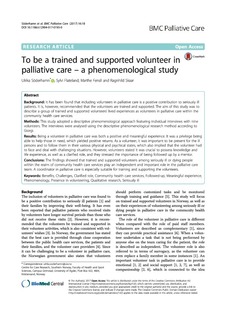| dc.description.abstract | Background: It has been found that including volunteers in palliative care is a positive contribution to seriously ill patients. It is, however, recommended that the volunteers are trained and supported. The aim of this study was to describe a group of trained and supported volunteers’ lived experiences as volunteers in palliative care within the community health care services. Methods: This study adopted a descriptive phenomenological approach featuring individual interviews with nine volunteers. The interviews were analysed using the descriptive phenomenological research method according to Giorgi. Results: Being a volunteer in palliative care was both a positive and meaningful experience. It was a privilege being able to help those in need, which yielded positive returns. As a volunteer, it was important to be present for the ill persons and to follow them in their various physical and psychical states, which also implied that the volunteer had to face and deal with challenging situations. However, volunteers stated it was crucial to possess knowledge and life experience, as well as a clarified role, and they stressed the importance of being followed up by a mentor. Conclusions: The findings showed that trained and supported volunteers among seriously ill or dying people within the realm of community health care services play an independent and important role in the palliative care team. A coordinator in palliative care is especially suitable for training and supporting the volunteers. Keywords: Benefits, Challenges, Clarified role, Community health care services, Followed-up, Meaningful experience, Phenomenology, Presence in volunteering, Qualitative research, Seriously ill | nb_NO |

